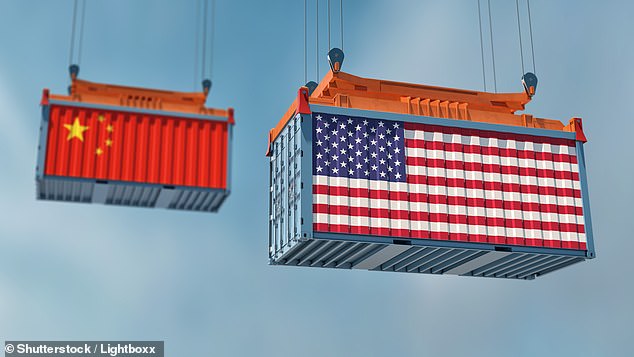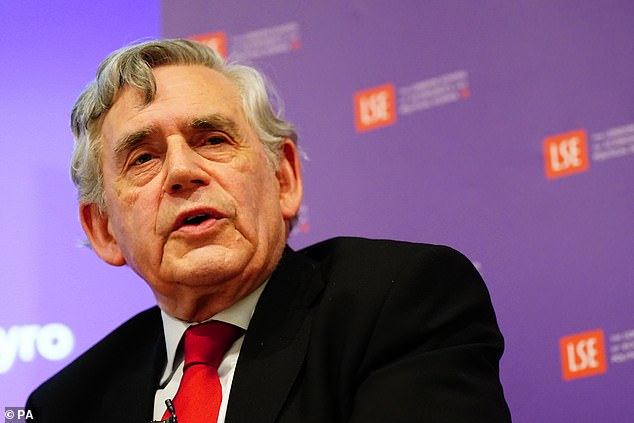Forget, for the moment, the current political stalemate on Capitol Hill, one of the key factors sending bond yields sky high and delivering a chilling message to share markets.
Of much more significance for global output and prosperity are the shifting geo-political tectonic plates.
It is no surprise that President Biden’s first act on returning from Israel this week was to take to the airwaves.

Clash: The changing world map and the power struggle between the United States and its rival China is stifling economic decision-making
In a Reagan-style speech, he went directly to the people to seek support for $100illiobn (£83billion) of military and economic assistance to be divided 60-40 between Ukraine and Israel.
Russia’s war on Ukraine and the obscene Hamas assault on Israel dramatically are changing the political and economic world order.
It seems only yesterday that I arrived for financial meetings in Bangkok (it was actually 1991!) and there on a table was an innocuous press notice announcing that Russia was applying to join the top table of capitalism at the International Monetary Fund.
There was a tremendous wave of optimism about the opportunities for economic progress and much talk of a peace dividend.
A place was even found for Russia as the eighth member of the G7 rich-countries club from which it has since been expelled.
How different it all looks now. The changing world map and the power struggle between the biggest economy, the United States, and its assertive Russian-friendly rival China, is stifling economic decision-making.

Brown era: When Gordon Brown helped establish the G20 in 2009 he brought China, Russia and Saudi Arabia to the table
At the time of the Great Financial Crisis in 2008-09, the IMF and other financial organisations were castigated for failing to see it coming.
One suspects the IMF-World Bank meeting in Marrakesh, the first held in an Arab country, may come to be seen in the same light of failure.
The shock of Israel-Gaza overwhelmed the narrative. What was not widely discussed, except behind closed doors, is how polarisation is defeating global decision-making.
When Gordon Brown helped establish the G20 in 2009 he brought China, Russia and Saudi Arabia to the table for an international operation to avert a 1930s style depression.
When the G20 met in Marrakesh, all that emerged were a series of bromides about output and little about war raging in the heart of Europe, which has delivered inflation pain to the West and starved the poorer South of grain and other resources.
Nor was there a word about the dangers to economic well-being of a conflict in the Middle East which already has led the Americans to shift two aircraft carriers to the Eastern Mediterranean.
It was left to the World Bank, which has long had a significant role in the West Bank (and to lesser extent Gaza), to tell staff in that it was ‘appalled’ by the escalation of violence and the ‘targeting and kidnapping of innocent civilians.’
The Bank, under the new slicker leadership of Ajay Banga, finds itself at the vortex of events. China’s tough line on debt forgiveness – as has been seen in Sri Lanka – is a new weapon as Beijing asserts itself in Africa, Latin America and beyond, which is getting in the way of the Bank’s mission to make the world a better place.
Similarly, efforts to expand IMF funding through changes in its shareholding structure known as quotas, are hostage to US-China relations and deep divisions across the Middle East.
War may have some economic and financial benefits for nations such the UK, France and the US, with defence systems and weapons manufacturing capacity.
But it is also a jolt to economic cohesion at a moment of economic fragility where high levels of G7 debt, surging oil prices and muscle-rippling central banks are smothering the prospects for expansion.
Scotch mist
Could Rishi Sunak learn something from Scotland’s first minister Humza Yousaf?
The SNP leader is proposing to go directly to the markets to issue Scottish infrastructure bonds to fund affordable housing.
A more creative Tory government might have gone straight to the taxpayer with an offer of HS2-Manchester bonds offering the kind of coupon which has made recent National Savings offers so popular.
The banks would object and the Treasury would fear disruption to the gilts market. Former head of the Treasury Nick Macpherson has tweeted such bonds might be more costly.
Nevertheless, giving citizens a chance to invest in big projects directly, with HMG’s imprimatur, is an intriguing opportunity.




